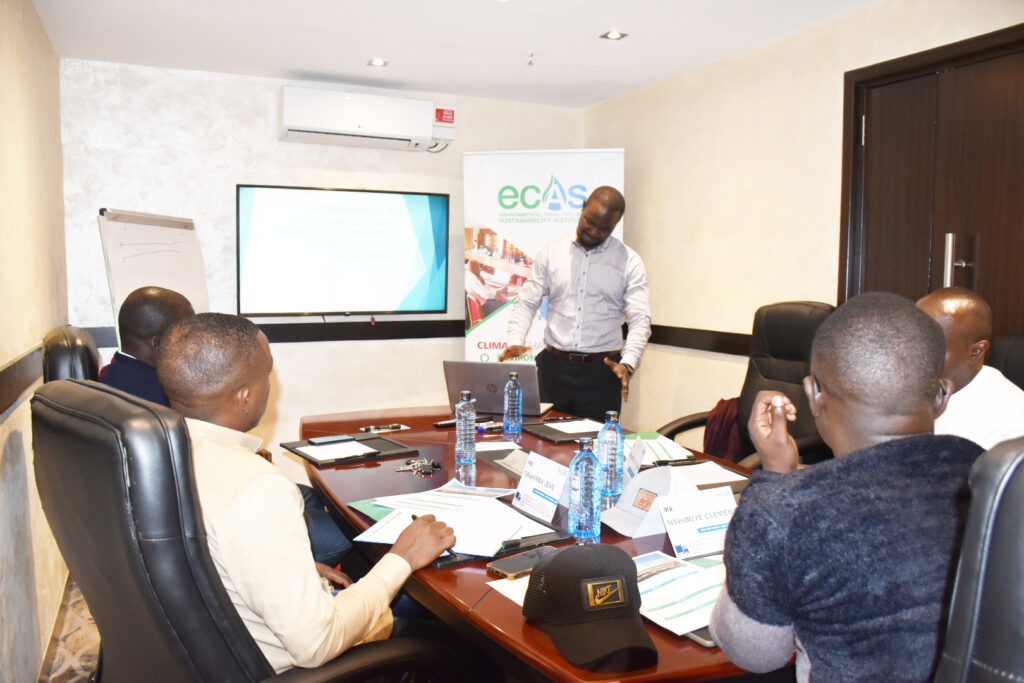
INTERNATIONAL TRAINING ON INTRODUCTION TO FOREST AND LANDSCAPE RESTORATION
COURSE BACKGROUND
Degraded forests and landscapes harm our climate, affect food security, and impact community livelihoods worldwide. Restoring these areas is vital for a healthy planet and thriving communities. This course introduces Forest and Landscape Restoration (FLR) as a key solution.
ECAS Institute believes in healing degraded lands for a sustainable future. We recognize FLR as a powerful way to bring people together to create healthy and productive landscapes. This course helps individuals and organizations understand FLR, aligning with our goal to support global environmental recovery.
This training aims to make FLR concepts clear and accessible. It will cover why FLR matters, its benefits, and the steps involved in restoring natural areas. By providing this core knowledge, ECAS hopes to speed up the adoption and success of FLR efforts globally.
COURSE OBJECTIVES OF THE TRAINING
Upon completion of this training, participants will be able to:
- Explain the importance and key concepts of Forest and Landscape Restoration (FLR).
- Describe the benefits of FLR and how it contributes to achieving national, regional, and global environmental commitments.
- Outline the three key steps of the FLR process.
- Understand the importance of engaging stakeholders in all stages of FLR and navigating potentially conflicting objectives.
- Identify various considerations for effectively implementing, managing, and monitoring FLR initiatives.
- Recognize the common barriers and key success factors for FLR.
WHAT YOU WILL LEARN
This course will provide a comprehensive introduction to the principles and process of Forest and Landscape Restoration. You will learn:
- The importance of FLR and its key concepts.
- The benefits of FLR and how it helps countries to achieve their national, regional and global commitments.
- The three key steps of the FLR process.
- The importance of engaging stakeholders in all steps of FLR and negotiating between potentially conflicting objectives.
- The various considerations when implementing, managing and monitoring FLR.
- Barriers and success factors for FLR.
DURATION AND PROGRAM
This is a structured training course. The program is designed to provide a comprehensive introduction to Forest and Landscape Restoration, combining theoretical knowledge with practical examples and case studies. The detailed program schedule, including specific session timings and opportunities for interactive discussions, will be communicated prior to the training commencement.
TARGET PARTICIPANTS
This course is designed for a range of stakeholders with an interest in forest and landscape restoration, including:
- National governments;
- Development organizations;
- Non-governmental organizations (NGOs); and
- Research institutes and universities.
TRAINING MODULES
The course consists of logically structured modules designed to guide participants through the core concepts and process of Forest and Landscape Restoration:
| No | Module | Details | |
| 1. | Understanding Forest and Landscape Restoration (FLR) |
This module provides a foundational understanding of forest and landscape degradation, introducing FLR as a holistic solution and outlining its critical importance for global sustainability.
|
|
| 2. | The Benefits of FLR and Global Commitments |
This module explores the multi-faceted benefits derived from successful FLR initiatives, demonstrating how restoration contributes to national and international environmental and development goals.
|
|
| 3. | The Core FLR Process Steps |
This module breaks down the structured, three-step process of planning and initiating FLR, providing participants with a clear roadmap for early-stage implementation.
|
|
| 4. | Engaging Stakeholders in FLR |
This module emphasizes the crucial role of human collaboration in FLR, covering strategies for bringing together diverse groups and managing potentially conflicting interests.
|
|
|
5.
|
Implementing, Managing, and Monitoring FLR |
This module provides practical considerations for the long-term success of FLR projects, covering aspects from ongoing management to measuring effectiveness and learning from challenges.
|
|
TRAINING STYLE
The modules will be taught through PowerPoint presentations, and lectures and will include a case study/field visit, breakout sessions, case studies and other interactive discussion components.
The course will also include a few guest speakers, both in person and via Zoom and other online learning platforms for overseas speakers. This provides useful real-world insights alongside the more theoretical aspects of the course.
The conference faculty shall consist of experienced decision makers, as well as practitioners and representatives from established educational and research institutions active around climate change, engineering and international development. Throughout the course, theoretical presentation of concepts will be moderated and more group discussions and plenary engagements will be optimized. PowerPoint presentations will be made by facilitators and resource persons, to highlight key concepts before embarking on group work.
GENERAL NOTES
- Training manuals and additional reference materials are provided to the participants.
- Upon successful completion of this course, participants will be issued with a certificate.
- We can also do this as a tailor-made course to meet organization-wide needs. Contact us to find out more: info@ecasiafrica.org.
- Payment should be sent to our bank account before the start of training and proof of payment sent to: info@ecasiafrica.org.
ABOUT ECAS INSTITUTE
The ECAS Institute designs and delivers independent and targeted training, research, and consulting services. Our work focusses on climate change and resilience building, carbon markets, renewable energy, nature-based solution, biodiversity conservation, agriculture and food systems, We are located in Nairobi Kenya and work across the African region. We have implemented training and research assignments in Kenya, Tanzania, Uganda, South Sudan, Somalia, Malawi, Rwanda, Congo, and South Africa. Globally, we have supported our partners from the UK, Denmark, Italy, Sweden, Germany, and USA.

